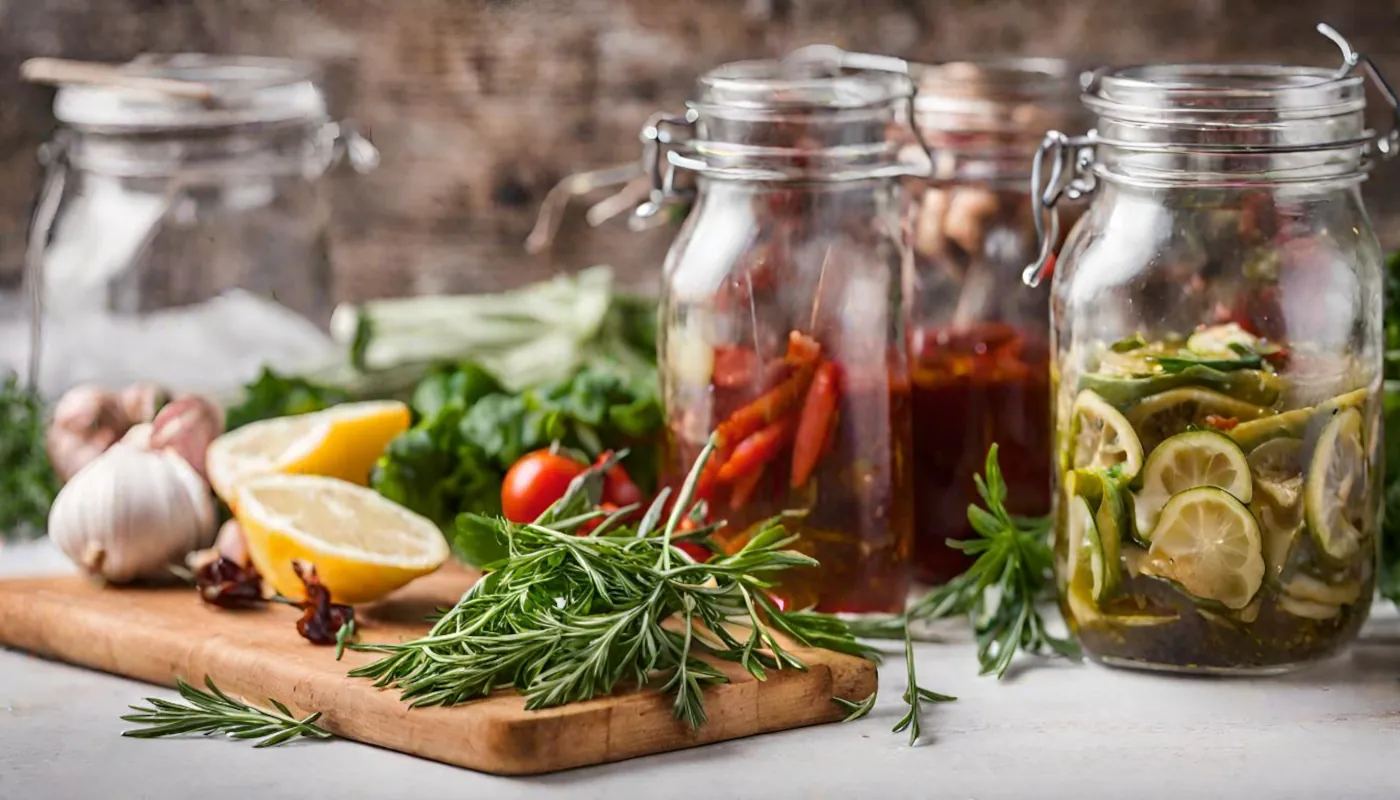Introduction to Quick Marination
In today’s fast-paced culinary world, how do you marinate quickly and effectively? Marinating, an age-old technique, has long been cherished for its ability to infuse deep flavors and tenderize meats and vegetables. Traditionally, marination might require hours or even days, but in our bustling lifestyles, such extensive time commitments aren’t always feasible. Consequently, this raises an important question: “How can you achieve the same flavorful results in a fraction of the time?”
Fortunately, this article delves into the art of quick marination, offering a variety of techniques, practical tips, and insightful knowledge to enhance your cooking. We’ll explore efficient methods to impart rich flavors into your dishes, ensuring that even with time constraints, your culinary creations don’t compromise on taste. So, let’s embark on this journey to discover how to marinate swiftly, transforming your cooking experiences without the long wait.
How Do You Marinate Quickly: Understanding the Basics
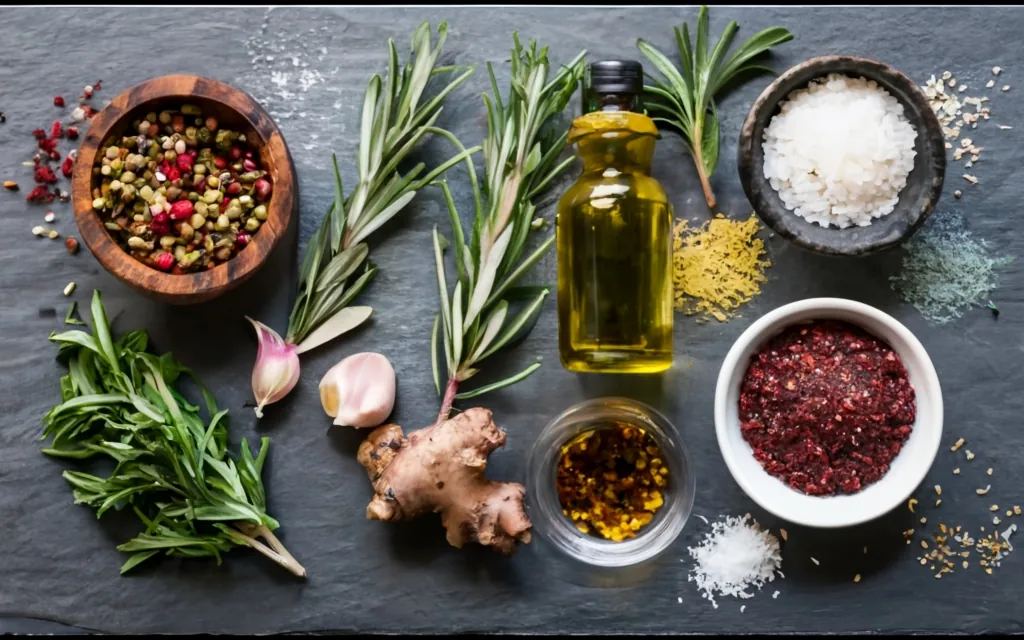
Quick Marination Essentials: How Do You Marinate Quickly?
Marination involves soaking food, typically meat, in a mixture of ingredients like acids (vinegar or citrus), oils, herbs, and spices. Understanding the 3 main ingredients when marinating is crucial for quick and effective flavor infusion. This process not only adds flavor but can also tenderize tougher cuts of meat. Traditional marination can take several hours, but quick marination aims to achieve similar results in a fraction of the time.
Why Quick Marination Matters: Speedy Flavor Infusion Techniques
In our fast-moving lifestyle, time is a luxury. Quick marination caters to this need, providing a way to prepare flavorful meals without extensive planning. It’s perfect for impromptu gatherings or when you’re short on time but still want a meal that’s both delicious and nutritious.
Maximizing Flavor: Mastering Quick Marination Techniques
Using Acidic Ingredients: How to Marinate Quickly and Effectively
When considering how to marinate quickly, using acidic ingredients is key. Acids like lemon juice, vinegar, or yogurt are key to quick marination. They break down proteins, allowing flavors to penetrate more rapidly. However, too much acid can toughen the meat, so it’s a delicate balance. For a deeper understanding of this process, refer to The Science of Marinating for comprehensive insights.
Enzymes: Accelerating the Quick Marination Process
Enzymes found in fruits like pineapple, papaya, and kiwi can accelerate the tenderizing process. These enzymes break down protein structures, speeding up marination. However, they should be used cautiously as over-marination can lead to mushy textures.
Balancing Temperature and Time in Quick Marination
Marinating at room temperature can speed up the process, but it’s crucial to maintain food safety. As per Food Safety Guidelines for Marination, marinating should be done in the refrigerator if it extends beyond 30 minutes to prevent bacterial growth.
Choosing Ingredients for Quick Marination: How to Marinate Quickly
Selecting Ingredients for Effective Quick Marination
Selecting the right ingredients is crucial for effective quick marination. Opt for tender cuts of meat, as they absorb flavors faster. Explore what spices are good for marinating meat to enhance your marinade’s flavor profile. Use fresh herbs and spices for their potent flavors and aromatic oils. A balance of salty, sweet, and acidic components can enhance the marination process significantly.
Recipes for Rapid Marination
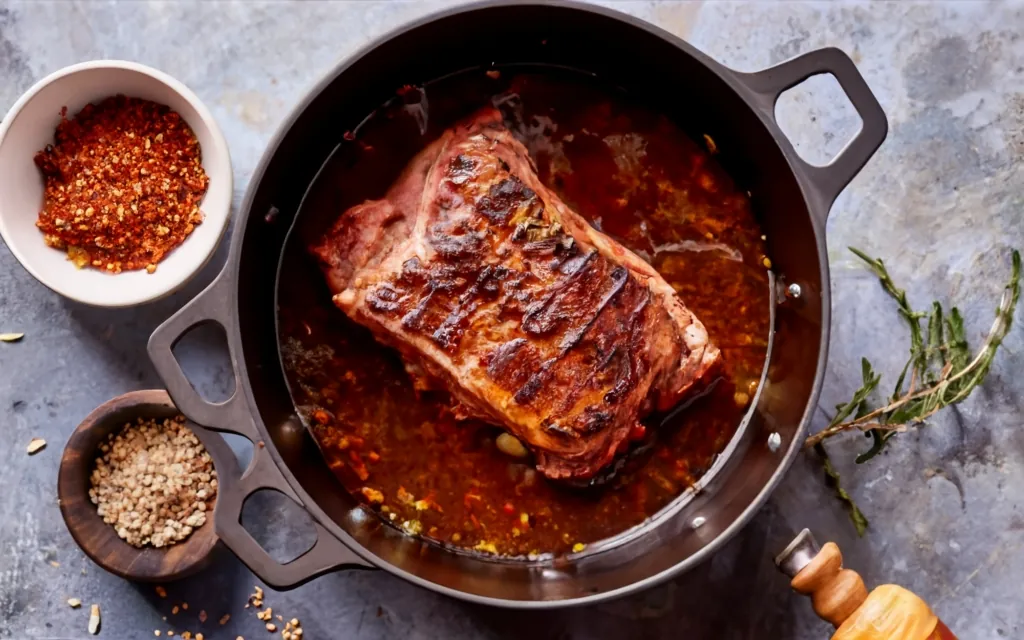
Experimenting with various ingredients can lead to delightful results. Consider, for instance, a simple marinade combining olive oil, lemon juice, minced garlic, and a blend of herbs, which can work wonders in just 30 minutes. If you’re looking for a straightforward yet effective option, our 4-Ingredient Chicken Marinade is worth trying. Additionally, for more creative recipes and ideas, delve into the culinary inspirations on BBC Good Food, showcasing a diverse range of global marination practices.
Professional Tips: How to Marinate Quickly and Efficiently
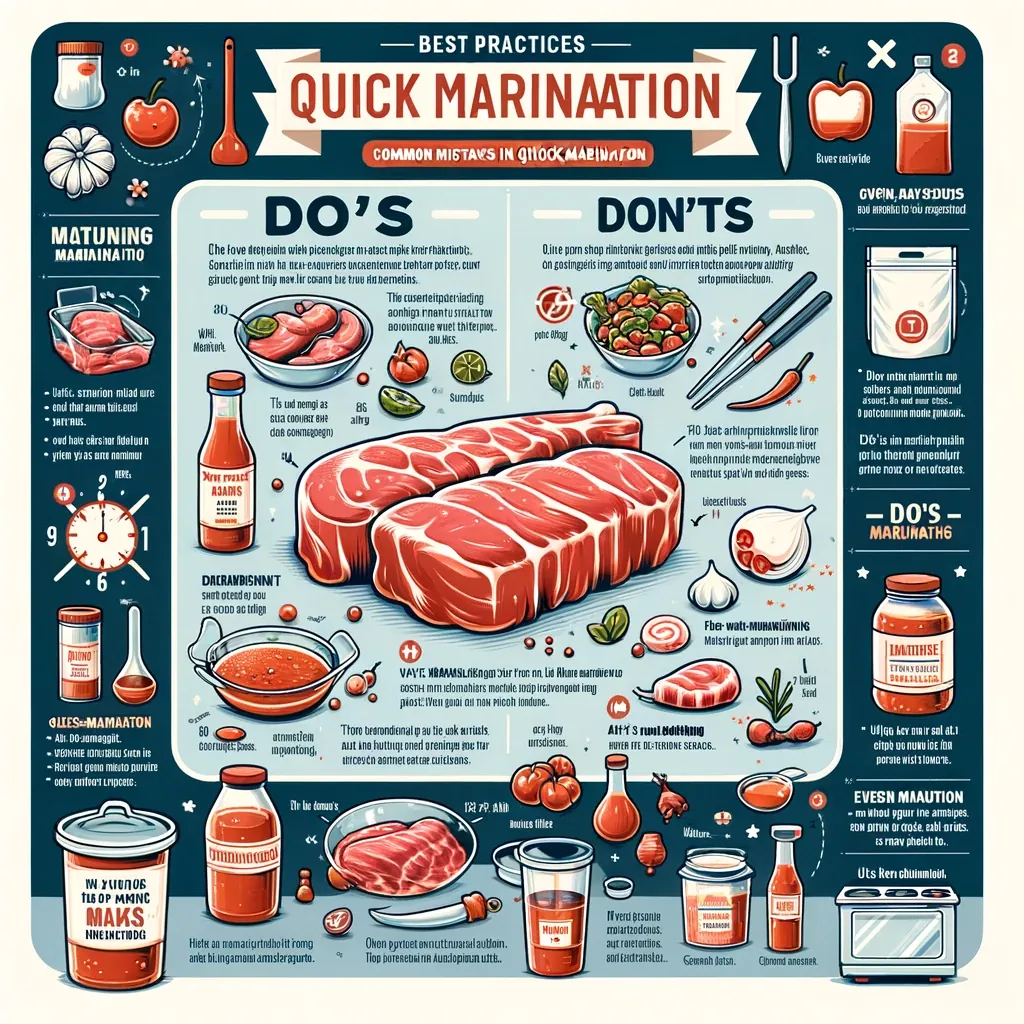
Maximizing Flavor: How to Marinate Quickly and Effectively
Maximize flavor in minimal time by focusing on the surface area. Thin cuts or small pieces of meat, like chicken strips or kebabs, absorb marinades faster. Scoring meat, such as creating shallow cuts on a flank steak, can enhance flavor penetration. For instance, a 20-minute marinade of olive oil, lemon, and herbs works wonders on thinly sliced chicken breast. Remember, quick marination combines speed with efficiency and effectiveness.
Common Mistakes to Avoid in Quick Marination
Over-marinating with acidic ingredients can lead to tough textures, especially in meats like chicken or fish. To avoid this, limit acidic marination times to under 30 minutes. Also, always pat dry the meat before cooking to ensure proper searing. A balance between marination time, meat type, and ingredients is crucial for the best outcome. If you accidentally over-marinate, try balancing it with a mild cooking method, like slow baking, to retain tenderness.
FAQs: Achieving the Best Results in Quick Marination
Can You Marinate Too Quickly? Yes, while quick marination is efficient, flavors need time to infuse. A few minutes may not be enough for denser meats like beef. Aim for at least 15-30 minutes for lighter marinades and up to 1 hour for more intense flavors. What Are the Best Meats for Quick Marination? Chicken breasts, fish fillets, and thin steak cuts like flank or skirt are ideal. These meats don’t require long to absorb flavors and are less likely to become tough with acidic marinades.
Advanced Techniques and Variations in Quick Marination
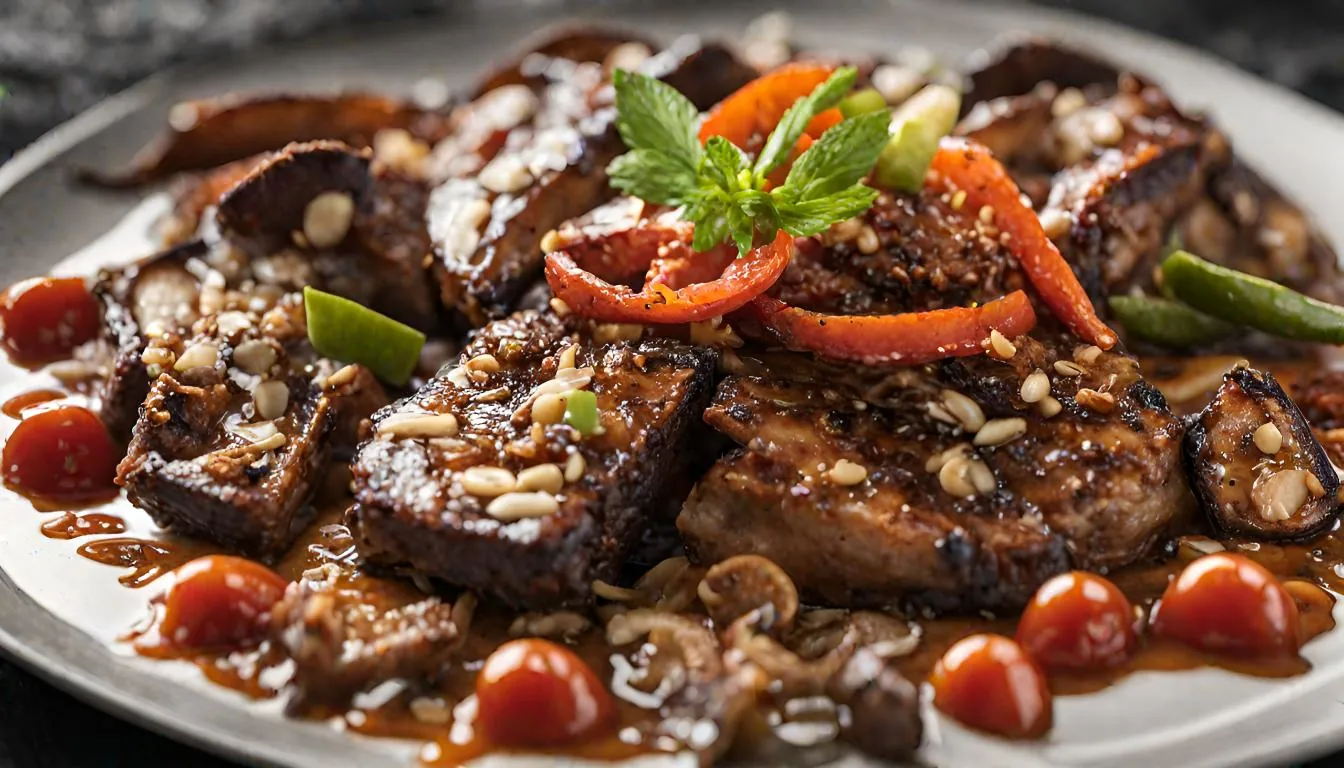
Explore the art of quick marination with techniques like flash marination, using a blend of soy sauce, ginger, and garlic for 15 minutes to impart intense flavor to beef strips. Cultural influences, such as the use of yogurt and spices in Indian cuisine, offer a rich tapestry of flavors that can be achieved swiftly.
Health Benefits and Dietary Considerations in Quick Marination
Marinating can reduce harmful compounds in high-heat cooking and add antioxidants with ingredients like garlic and herbs. For low-sodium diets, try replacing soy sauce with low-sodium alternatives or citrus juices. For gluten-free needs, ensure all sauces and condiments are gluten-free.
Sustainability and Ethical Considerations
Choose locally sourced, organic herbs and sustainably raised meats to reduce environmental impact and support animal welfare. This approach enhances the quality and flavor of your dishes.
Storing and Reusing Marinades: Safety and Creativity
Store used marinades properly and boil them before reuse to eliminate harmful bacteria. Get creative by using leftover marinades as a base for stir-fry sauces or salad dressings.
Seasonal and Regional Variations in Quick Marination
Embrace the changing seasons in your marinades. Use fresh summer berries or autumnal apples for unique flavor twists. Globally, regional techniques like the quick Korean bulgogi marinade offer a world of flavor in mere minutes.
Pairing Marinades with Side Dishes
Select side dishes that complement your main course. For example, a citrus-based marinade pairs well with a light quinoa salad, while a rich soy-based marinade can be balanced with steamed vegetables.
The Future of Marination: Trends and Technological Advances
Stay abreast of emerging trends like fusion flavors and eco-friendly marination techniques. Technologies like vacuum marination are revolutionizing the process, promising more efficient and flavorful outcomes.
Maximizing Efficiency in Quick Marination: Practical Tips and Misconceptions
Quick marination is not just about saving time; it’s about effectively infusing flavor and tenderness into your dishes. Here, we’ll debunk a few misconceptions and provide practical tips to make your quick marination more efficient. Contrary to popular belief, marination is not a one-size-fits-all process; different meats and vegetables may require specific approaches. For instance, while acidic marinades work well for tougher meats, they might not be suitable for delicate fish. Additionally, it’s a myth that marinating for longer always results in better flavor. In fact, over-marination, especially with acidic ingredients, can lead to a mushy or tough texture. To avoid this, understand the ideal marination times for various ingredients. Remember, quick marination is about precision in ingredient choice and timing, ensuring that each flavor component perfectly complements the main ingredient.
Conclusion: Embracing the Art of Quick Marination
The Fusion of Flavor and Efficiency
Quick marination transcends being just a time-saving technique; it represents a harmonious blend of culinary efficiency and global flavor exploration. This approach not only adapts age-old traditions to our fast-paced lives but also ensures no compromise on taste or quality. Significantly, it invites cooks to experiment, merging traditional ingredients with modern ones to craft unique flavor profiles.
Cultural Insights and Health Benefits
Furthermore, quick marination opens a window into diverse cultural culinary practices. It’s not merely about the infusion of flavors but also about understanding and appreciating the global origins of various marinades. Additionally, this method aligns with health-conscious cooking trends. By selecting the right ingredients, such as antioxidant-rich herbs and spices, marination transforms simple meals into nourishing experiences. Consequently, it’s not just the flavor that’s enhanced; there’s also a significant boost in nutritional value. Importantly, this approach to cooking allows for a creative yet healthful exploration of ingredients, seamlessly blending taste with well-being. Therefore, quick marination becomes more than a cooking technique; it emerges as a holistic culinary practice.
Mindful Cooking: Ethical and Environmental Considerations
Moreover, quick marination resonates with the increasing focus on ethical and sustainable cooking. Opting for organically sourced, sustainable ingredients elevates not only the dish’s quality but also reflects a commitment to environmental and animal welfare. This mindful approach extends the impact of quick marination beyond the kitchen, supporting sustainable practices.
Looking Towards the Future of Marination
In conclusion, quick marination is much more than a culinary shortcut. It’s a celebration of flavors, cultures, and healthful eating, all woven into a practice that respects our time and aligns with conscious living. As we embrace this technique, we open ourselves to a world of culinary innovation and enjoyment, perfectly suited for the modern epicurean lifestyle.
